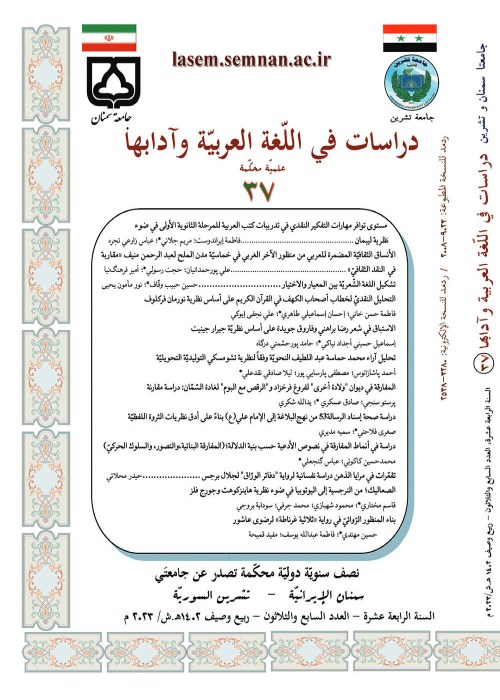Prolepse in the poetry of Reza Baraheni and Farouk Gouida, on the basis of Gérard Genette's theory
Author(s):
Article Type:
Research/Original Article (دارای رتبه معتبر)
Abstract:
Revealing the temporal structure in contemporary narrative poetry makes reader vulnerable to the multiplicity of tenses that overlap in one poem and lead to the formation of temporal paradoxes that the narrator uses in the course of the narration to achieve artistic purposes required by the text. Prolepse is one of the two wings of the temporal paradox in Gérard Genet's theory and is commonly used in modern poetry because of the great flexibility it enjoys to move past and present events and their temporal change forward without prejudice to the unity and texture of the text. The technique of prolepse in poetry of Farouk Gouida and Reza Baraheni helps to know possible temporal developments in the structure of events and characters through allusions, allusions and symbols that contribute to involving the reader in the course of text developments and answering questions and suspicions that he sometimes asks. This study relies on the descriptive-analytical approach, as it benefits from the critical pillars of the American School of Comparative Literature, aiming to clarify the functions of the narrative anticipation technique in the poetry of Farouk Juwaida and Reza Baraheni. This research was able to reach that the technique of anticipation in the poetry of Farouk Juwaida and Reza Baraheni indicates the poets' attempt to achieve the temporal surprise in the narrative process by applying three forward-looking types, each of which carries its own mission, including the preliminary anticipation, which aims in the poetry of Farouk Juwaida to anticipate the developments of outer space on Contrary to the future references that Reza Baraheni targets in the opening poems, it is distinguished by the inevitability of falling into the future. As for the declarative anticipation in Farouk Jwaideh's poetry, it has more clarity in illuminating upcoming events, compared to what came in the poetry of Reza Baraheni. In Farouk Jwaideh's poetry, the internal anticipation is subject only to reducing the shortcomings of the future, and in Baraheni's poetry to consolidating future events. In the end, the external anticipation in Farouk Jwaida's poetry is the task of expanding the narrative space and helps, when Reza Baraheni, to realize the realities of the present narration.
Keywords:
Language:
Arabic
Published:
Studies on Arabic language and Literature, Volume:14 Issue: 37, 2023
Pages:
109 to 134
magiran.com/p2652447
دانلود و مطالعه متن این مقاله با یکی از روشهای زیر امکان پذیر است:
اشتراک شخصی
با عضویت و پرداخت آنلاین حق اشتراک یکساله به مبلغ 1,390,000ريال میتوانید 70 عنوان مطلب دانلود کنید!
اشتراک سازمانی
به کتابخانه دانشگاه یا محل کار خود پیشنهاد کنید تا اشتراک سازمانی این پایگاه را برای دسترسی نامحدود همه کاربران به متن مطالب تهیه نمایند!
توجه!
- حق عضویت دریافتی صرف حمایت از نشریات عضو و نگهداری، تکمیل و توسعه مگیران میشود.
- پرداخت حق اشتراک و دانلود مقالات اجازه بازنشر آن در سایر رسانههای چاپی و دیجیتال را به کاربر نمیدهد.
In order to view content subscription is required
Personal subscription
Subscribe magiran.com for 70 € euros via PayPal and download 70 articles during a year.
Organization subscription
Please contact us to subscribe your university or library for unlimited access!



